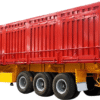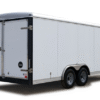Ever found yourself staring at a 500-gallon fuel tank trailer, scratching your head wondering, ‘Just how heavy is this thing?’ Trust me, you’re not alone. As someone who’s hauled fuel trailers for years, figuring out the actual weight – before hitching up or planning a route – isn’t just a technicality; it’s critical for safety, legal compliance (hello, DOT regulations!), and preventing a costly rookie mistake like overloading your truck. The answer, frustratingly, isn’t a single magic number plastered on the side.
Why the confusion? Well, from my experience prepping trailers for jobsites and farms, the weight of an empty 500-gallon tank trailer itself can swing significantly based on how it’s built. Is it rugged, thick-walled steel built for tough off-road use, or a lighter aluminum model designed for highway efficiency? Does it have heavy-duty baffles inside to control fuel slosh (essential for stability, but they add pounds), robust fenders, multiple toolboxes, or extra valves? These construction choices make a real difference on the scale before you even add a drop of diesel.
And that brings us to the big hitter: the fuel itself. When folks ask me ‘how much does it weigh?’, they often forget that full means full – and 500 gallons of diesel adds roughly 3,500 pounds right off the bat! So, the total weight you’re actually pulling down the highway is a combination of that hefty liquid payload plus the trailer’s own ‘tare weight’. Let me break down the typical ranges I’ve seen over the years, so you can get a solid estimate for your specific needs and avoid any nasty surprises at the weigh station.
Empty Weight of a 500 Gallon Fuel Trailer (Dry Weight)
If you need the empty weight for a 500-gallon fuel trailer, I suggest checking the specs on individual models. For example, the FuelPro® 500 BM Fuel Trailer weighs 2,000 lbs empty. The Texas Boom/LEE D.O.T. 500 Diesel Fuel Trailer has a dry weight of 1,878 lbs. I notice both models have a 500-gallon tank and a Gross Vehicle Weight Rating (GVWR) of 7,000 lbs.
Typical Empty Weight Range for 500 Gallon Fuel Trailers
Based on my experience, you’ll find that most 500-gallon fuel trailers weigh between 1,878 lbs and 2,000 lbs when empty. The exact weight varies by maker, design, and the features included.
Weight Comparison Table
| Manufacturer/Model | Dry/Empty Weight | GVWR | Tank Size |
|---|---|---|---|
| FuelPro® 500 BM | 2,000 lbs | 7,000 lbs | 500 gallons |
| Texas Boom/LEE D.O.T. 500 | 1,878 lbs | 7,000 lbs | 500 gallons |
Features That Affect Dry Weight
I’ve noticed several key features influence a trailer’s empty weight:
- Heavy-duty steel construction
- Axle configuration: single or dual axles
- Safety equipment: chains, LED lighting, reflectors
- Additional storage: equipment box for battery or tools
- Typical dry weight: 1,878–2,000 lbs
- Typical 500 gallon fuel trailer GVWR: 7,000 lbs
Weight of 500 Gallons of Fuel: Gasoline vs Diesel and Other Liquids
From my experience, the total weight of 500 gallons of fuel depends on a few things. These are the fuel type, its density, and the temperature when you measure it.
Average Weights for Different Fuels
| Fuel Type | Average Weight (lbs/gal) | 500 Gallons (lbs) | Notes |
|---|---|---|---|
| Gasoline (Regular) | 6.073 | 3,036.5 |
|
| Diesel | 7.1 | 3,550 | — |
| Jet Fuel | 6.71 | 3,355 | — |
| Water (Comparison) | 8.329 | 4,164.5 | — |
Fuel Weight Comparison Table
| Fuel Type | Weight per Gallon (lbs) | Total Weight for 500 Gallons (lbs) |
|---|---|---|
| Gasoline | 6.073 | 3,036.5 |
| Diesel | 7.1 | 3,550 |
| Jet Fuel | 6.71 | 3,355 |
| Water | 8.329 | 4,164.5 |
Key Factors Affecting Weight
- Fuel type: Gasoline, diesel, jet fuel, and water all have different densities.
- Temperature: When the temperature goes up, the fuel’s density goes down. This means its weight per gallon also decreases.
- Additives and fuel grade: I find that different additives or grades can also alter the average weight per gallon.
Here’s How I Calculate the Weight
To find the total weight, the math is straightforward. You multiply the number of gallons by the fuel’s average pounds per gallon:
– Gasoline:
\( 500 \times 6.073 = 3,036.5 \) lbs
– Diesel:
\( 500 \times 7.1 = 3,550 \) lbs
- 500 gallons of gasoline weighs about 3,036.5 lbs
- 500 gallons of diesel weighs about 3,550 lbs
- For the most accurate calculation, I suggest you check the specific fuel’s density. You should also factor in the temperature.
Total Loaded Weight of a 500 Gallon Fuel Trailer (Wet Weight)
A 500-gallon fuel trailer’s total loaded weight (wet weight) includes its empty weight plus the fuel inside. From my experience, this is the most important number you need. It helps you tow safely, meet legal requirements, and pick the right vehicle.
My Suggested Wet Weight Calculation
- Empty trailer weight: Most common models weigh between 1,878 lbs and 2,000 lbs.
- Fuel weight (diesel): Diesel weighs about 7.1 lbs per gallon.
So, here is the math for a 500-gallon diesel fuel trailer with a full tank:
Fuel weight: (500 \text{ gallons} \times 7.1 \text{ lbs/gallon} = 3,550 \text{ lbs})
Total loaded (wet) weight range:
(1,878 \text{ lbs (dry)} + 3,550 \text{ lbs (fuel)} = 5,428 \text{ lbs})
(2,000 \text{ lbs (dry)} + 3,550 \text{ lbs (fuel)} = 5,550 \text{ lbs})
In summary:
A 500-gallon diesel tank trailer with a full tank will weigh between 5,428–5,550 lbs.
My Thoughts on GVWR and Safety Margins
I’ve noticed most 500-gallon fuel trailers have a Gross Vehicle Weight Rating (GVWR) of 7,000 lbs. This rating gives you a good safety buffer. It accounts for the trailer, a full fuel load, and any extra tools or accessories you might carry.
Example Models and Specs
| Specification | Typical Figure |
|---|---|
| Empty (Dry) Weight | 1,878–2,000 lbs |
| Fuel Capacity | 500 gallons |
| Fuel Weight (Diesel) | ~3,550 lbs |
| Total Loaded (Wet) Weight | 5,428–5,550 lbs |
| GVWR | 7,000 lbs |
| Axles | Dual 3,500 lbs |
| Dimensions (L×W×H) | 150in × 81in × 77in (approx.) |
Example Models
- FuelPro® 500:
- Dry weight: 2,000 lbs
- Wet weight: ~5,550 lbs
- LEE D.O.T. 500:
- Dry weight: 1,878 lbs
- Wet weight: ~5,428 lbs
Typical Trailer Dimensions and Features
- Length: 11’6″–12’6″ (approx. 150 inches)
- Width: 5’10″–6’9″ (approx. 81 inches)
- Height: 4’8″–6’5″ (approx. 77 inches)
- Tires: 15″–16″, D-range or similar
- Axle setup: Dual 3,500 lb rated axles
- Frame: Sturdy steel, with 4″ or 6″ channel construction
Note: I want to point out that the actual loaded weight can vary. This depends on optional features, construction materials, or if you use a different fuel. In my experience, most standard 500-gallon trailers stay well under the 7,000 lbs GVWR, even with a full tank.
Key Factors That Affect 500-Gallon Fuel Tank Trailer Weight
From my experience, the final weight of a 500-gallon fuel tank trailer comes down to a few key build and equipment choices. Let me show you what makes the biggest difference:
Tank Material and Construction
Material Quality and Thickness: Most 500-gallon fuel tanks use heavy-duty steel. The steel’s thickness, or gauge, is very important. For example, a FuelPro® 500 trailer uses thick 7-gauge steel and is double seam welded. This contributes to its empty weight of about 2,000 lbs.Single vs. Double Wall Tanks: A double-walled tank adds a lot of weight. A basic double-wall UL 500-gallon tank can weigh about 1,825 lbs when empty. I’ve seen models with extra reinforcements or safety layers that weigh up to 3,750 lbs empty. That’s a huge difference.Frame Design: Most base trailer frames use 5″ or 6″ channel iron. A stronger or longer frame will add more weight. I find that these frames are often 11’6″ to 12′ long and are welded to last.Axles and Suspension: Trailer axles add a good amount of weight. In my opinion, you should pay attention to this. Models can have dual 3,500 lb torsion axles. Others might have tandem 5,200 lb axles for better load support.
Equipment and Accessories
Pump System and Fuel Handling: Pumps, filters, and other fueling accessories will increase the weight. For instance, a 20 gpm 12vdc pump system adds a few extra pounds.Safety and Compliance Features: Safety is key, but it adds weight. I recommend looking at features like electric brakes, digital breakaway kits, and LED lighting. These items, along with rollover railings and safety chains, help you meet regulations. They also increase the trailer’s empty weight.Extras and Options: Don’t forget the extras. Things like storage boxes for tools or batteries add weight. Heavy-duty hitches, like a 2-5/16” ball or pintle, also add to the total. The same goes for reinforced couplers.https://www.youtube.com/watch?v=e2XQWIYRPGE
Tires, Wheels, and Baffles
Tires: Most trailers I see use 15″ or 16″ tires that are 10–14 ply. On tandem axle trailers, you’ll have a set of four. Each tire adds some weight, and it all contributes to the total.Internal Baffles and Safety Systems: Internal parts also add weight. Baffles inside the tank prevent fuel from surging. Cross bracing, pressure relief vents, and other safety hardware increase the trailer’s total mass.FuelPro® 500 (7-gauge steel, dual torsion axles): Empty weight 2,000 lbs, GVWR 7,000 lbs.Sunbelt Rentals 500 Gallon Double Wall UL Fuel Tank: Its dry weight is between 1,825 lbs for a basic model and 3,750 lbs for a full-featured 500ET.Hull Welding 500 Gallon Tandem Axle Fuel Tank Trailer: This trailer is 12′ long with 5,200 lb tandem axles. From my experience, its weight is similar to the other examples, especially with all the equipment installed.
Summary Table: Weight-Influencing Features
| Feature | Notes |
|---|---|
| Steel thickness/type | Heavier steel = heavier trailer |
| Single/double wall | Double walls add a lot of weight |
| Frame size/material | Longer, thicker frame = more weight |
| Axle number/size | Tandem axles increase trailer weight |
| Tire size/ply rating | Larger, sturdier tires add weight |
| Pump/accessories installed | Each adds pounds to the base dry weight |
| Safety equipment | Brakes, lighting, chains increase weight |
| Storage boxes/hitches | Optional but add weight if installed |
| Internal baffles | Add weight, improve safety and compliance |
In summary:
The empty weight for these trailers falls between 1,800 to 3,750 lbs. I find the biggest factors are the steel used, the wall design, and the frame and axle setup. Added safety or utility features also play a big role. Based on what I’ve seen, the specific configuration and options you pick will change the final weight.
summary
Based on my years of experience hauling trailers, I’ve learned that understanding your weight is more than a number on paper. It is about feeling confident and in control on the road.Whether you pull 5,400 pounds or 5,550 pounds, knowing the correct weight is essential. It keeps you safe. It keeps you legal. You will be prepared for any weigh station you come across.I recommend you take the time to calculate the weight for your specific trailer setup. When you know your numbers, you won’t have to worry or guess about it again.
FAQS
1. What is the average weight of an empty 500-gallon fuel tank trailer?
An empty 500-gallon fuel tank trailer typically weighs between 1,200 to 2,500 lbs, depending on construction. Steel trailers are heavier (1,800–2,500 lbs), while aluminum models can be as light as 1,200–1,800 lbs. Additional features like baffles, toolboxes, and reinforced frames add extra weight.
2. How much does a full 500-gallon fuel tank trailer weigh?
A full 500-gallon trailer’s weight depends on the fuel type:
-
Diesel: ~3,500 lbs (7 lbs/gallon)
-
Gasoline: ~3,000 lbs (6 lbs/gallon)
Add this to the trailer’s empty weight (tare weight) for the total gross weight, usually 4,500–6,000 lbs when fully loaded.
3. Do I need a special license to tow a 500-gallon fuel tank trailer?
In most U.S. states, if the combined weight of your truck and trailer stays under 26,000 lbs, a standard driver’s license is sufficient. However, check local DOT regulations—some states require additional endorsements for hazardous materials (if hauling flammable fuels).
4. What factors affect the weight of a 500-gallon fuel tank trailer?
Key factors include:
-
Material: Steel vs. aluminum construction
-
Baffles: Internal baffles (reduce sloshing) add weight
-
Accessories: Toolboxes, extra valves, reinforced axles
-
Fuel type: Diesel weighs more than gasoline
5. How do I find the exact weight of my fuel tank trailer?
The easiest way is to check the manufacturer’s spec sheet or the tare weight sticker (usually on the trailer’s frame). For the most accurate measurement, take it to a truck weigh station or a CAT scale at a truck stop.







